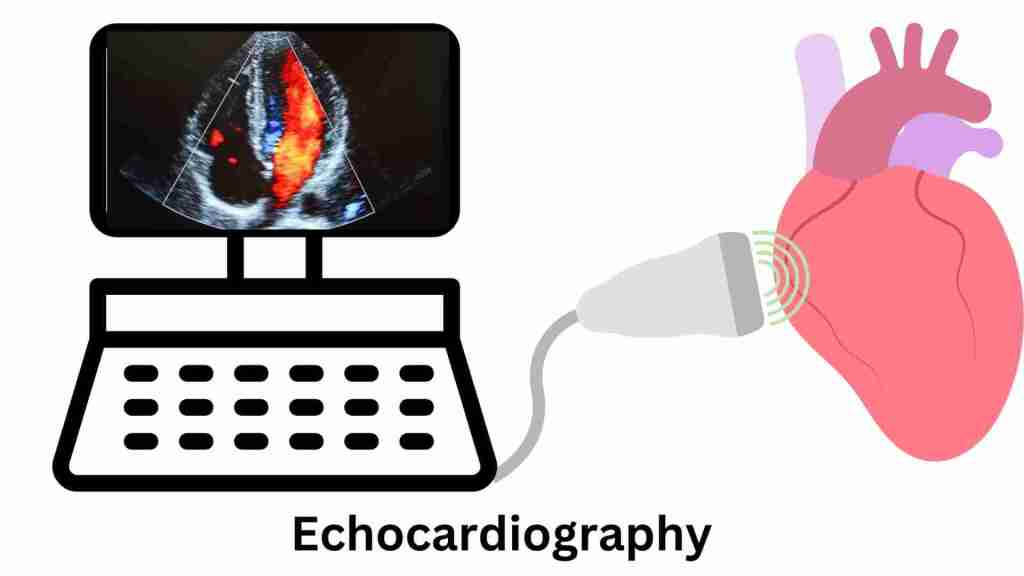If your echocardiogram (echo) results are normal, you may wonder if your heart is healthy. Our article explains the relationship between normal echo results and heart health, providing valuable insights into what a normal echo means for your cardiovascular system.
Quick Answer
A normal echocardiogram (echo) result means that your heart functions within normal parameters, but it does not guarantee that it is entirely free from underlying issues. Combining echo results with other tests and physical examinations is important to get a comprehensive picture of your heart health. So if you still have question that If Echo Is Normal, Is My Heart Ok? Then continue reading.

What is Echo Test, and How It Works?
An echo test is a diagnostic procedure that uses sound waves to create an image of the heart.
It shows pictures of your heart muscle, valves, chambers, blood vessels, and other structures as they work.
During the test, the gel is placed on your skin. Then a device called transducer is moved over different areas of your body to produce detailed images of your heart from all angles. The transducer sends sound waves that bounce back to your heart and nearby organs, creating an image on a monitor.
This test is painless and non-invasive and takes about 30 minutes to complete.
Doctors watch these images in real time to check the health and function of your heart. They look at things like blood flow, blockages in arteries and muscle contraction etc.
What Can the Echo Test Detect?
The echo test can detect many things in your heart. Some important ones include:
- An echo test can detect abnormalities in the structure and function of the heart.
- It can detect heart valve disease, including leaky or narrow valves.
- Echo can identify any damage to the heart muscle, such as after a heart attack.
- It can detect the size and shape of the heart’s chambers, showing various conditions.
- The test can diagnose congenital heart defects (the abnormalities present at birth).
- Echo can detect fluid buildup around the heart, showing pericardial effusion.
- It can identify blood clots in the heart or other areas of the body.
- Echo can detect abnormal heart rhythms.
- The test can help determine the cause of heart murmurs (unusual sounds produced by blood circulating through the heart chambers).
- Echo can check the effectiveness of certain treatments, such as medicines or procedures to correct heart defects.
What Does a Normal Echo Mean?
A normal echocardiogram means that the heart is functioning within normal parameters. Specifically, a normal echo will show that:
- Normal parameters
A normal Echo means the heart functions within normal parameters, a positive sign for your heart health. It indicates that the heart is pumping blood effectively, and all its structures work normally.
- Correct size and shape of heart chambers
The size and shape of the heart’s chambers are important indicators of the heart’s health. A normal Echo shows that the heart’s chambers are the correct size and shape. It means that they can pump the appropriate amount of blood to meet the body’s demands.
- Proper functioning of heart valves
The heart valves play a crucial role in regulating blood flow through the heart. A normal Echo indicates that the heart’s valves are working normal. It means they are opening and closing at the right times, flowing the blood through the heart and vessels without any obstruction.
- The appropriate thickness of heart walls
The thickness of the heart walls is another important indicator of the heart’s health. A normal Echo shows that the heart’s walls are of the appropriate thickness. It means your heart is strong enough to pump blood without stress.
- Normal blood flows through the heart and blood vessels
The normal blood flow through the heart and blood vessels is important for good heart health. A normal Echo shows blood flowing through the heart and vessels without obstruction.
- Positive sign of a healthy heart:
A normal echocardiogram is a positive sign that the heart is healthy. It shows that the heart is capable of pumping blood efficiently. It can help reduce the risk of developing heart-related problems in the future.
- Lowe risks of future heart-related problems
Individuals who receive a normal Echo are at a lower risk of developing heart-related problems. But, it is still important to maintain a healthy lifestyle and track heart health to prevent any complications.
What Can a Normal Echo Not Detect?
A normal echocardiogram does not necessarily mean that your heart is entirely free from any underlying issues. While an echo is an excellent tool for diagnosing many heart conditions, some may not be detected. Some of these conditions are;
- Coronary Artery Disease (CAD)
Coronary Artery Disease is one of the important causes of death worldwide. It happens due to plaque buildup in the arteries that supply blood to heart muscles over time. And although an Echo is often used to diagnose heart diseases, there are instances where it might not be enough to uncover CAD.
- Arrhythmias that come and go
Arrhythmias are abnormal heart rhythms that can cause the heart to beat irregularly. While an Echo can detect certain types of arrhythmias, it may not be able to detect arrhythmias that come and go.
- Microvascular disease
Microvascular disease is a condition that affects the small blood vessels in the heart. It can cause chest pain, shortness of breath, and other symptoms. While an Echo can show if the heart muscle is not getting enough oxygen, it may not be able to detect early signs of microvascular disease.
- Small blood clots
An Echo may not be able to detect small blood clots that can form in the heart. These clots can be a risk factor for stroke and other heart problems.
- Other Blood Flow Issues Outside the Heart
The main purpose of an Echo is to examine the function of the heart chambers and the pumping ability. At the same time, this is crucial for monitoring cardiac health. There are limitations to blood flow issues in areas beyond the heart area.
Since Echo focus on the heart’s inner workings, it can miss the peripheral blood flow issues. Further testing is important to investigate these problems depending on individual cases.
In addition, an echocardiogram only provides a snapshot of the heart’s function at a single point. If you have a history of heart disease or are experiencing symptoms such as chest pain or shortness of breath, your doctor may recommend additional tests to evaluate your heart health further.

Relationship between Echo Results and Heart Health
The results of an echocardiogram can provide valuable information about the heart’s health. Here’s how normal and abnormal echocardiogram results relate to heart health:
- Normal Results
Normal Echo shows that the heart is healthy and can pump blood efficiently. It means that the heart’s chambers are of appropriate size and shape. Moreover, its valves function properly, and its walls are of the appropriate thickness.
A normal echo result indicates the heart is beating and pumping blood properly. However, it is essential to note that a normal echo does not guarantee that the heart is entirely healthy. There may be underlying issues that an echo cannot detect, such as early stages of heart disease or plaque buildup in the arteries.
Therefore, combining echo results with other tests and physical examinations is essential to get a comprehensive picture of your heart health.
- Abnormal Results
An abnormal Echo result shows that there may be an underlying heart problem that requires further testing and treatment. Abnormal Echo results may indicate heart valve diseases or the inability of the heart to pump blood.
Abnormal Echo results also need further testing to confirm diagnosis and treatment.
Final Words
To summarize, a normal echo provides valuable information about the function of your heart. However, it is essential to remember that an echo is only one tool used to evaluate heart health and may not detect all abnormalities or conditions.
A normal echo result does not mean any underlying heart problems. An Echo cannot detect all heart problems like coronary artery disease. So, it is necessary to discuss any concerns with your doctor to ensure proper diagnosis and treatment.
Additionally, even though your echo may show normal results now, factors such as age, lifestyle, and genetics may result in heart problems in later life. So, keep up with routine screenings and work to maintain a healthy heart to prevent future complications.
If you have any concerns or queries about your Echo test results, I’m here to help you! In case of any queries, feel free to contact me for an online consultancy from the comfort of your home. I’m here to help you on your journey towards a healthy heart. Your heart health is important, and I wish you a healthy heart.
1. Does an echo show a healthy heart?
An echocardiogram (Echo) is a common test used to examine the structure and function of the heart. The normal Echo result suggests the heart functions well but doesn’t rule out all heart problems.
2. What is a normal echo report?
A normal echo report shows that the heart’s chambers, valves, and major blood vessels function normally. The heart’s pumping function is also normal, and there is no evidence of any abnormality.
3. What are abnormal echo results?
Abnormal echo results can state heart conditions such as heart valve disorders, heart muscle damage, and blood clots. The results may also show reduced heart function or other abnormalities in blood flow.
4. What does 60F% mean in an echo report?
The percentage number in an echo report refers to the ejection fraction, which measures how well the heart is pumping blood. An ejection fraction of 60% indicates that 60% of the blood in the heart’s main pumping chamber is pumped out with each beat. It indicates the normal range.
5. Can an echo detect blockage?
An Echo can detect blockages in the heart’s blood vessels, but it is not as effective as other tests such as coronary angiography or cardiac CT scan. But, an echo can identify changes in blood flow patterns that may show the presence of a blockage.
6. What is normal Echo vs abnormal?
A normal echo result suggests that the heart’s structure and function are within the normal range. In comparison, an abnormal result indicates the presence of structural or functional abnormalities.
7. What does echo 45% mean?
An echo report with an ejection fraction of 45% suggests a slight decrease in the heart’s pumping ability. It may state an underlying heart condition that requires further evaluation and treatment.
8. Are Echo and ECG the same?
An ECG is a test that monitors the electrical activity of your heart. In contrast, an echo uses sound waves to create images of the heart’s structures and functions. Both tests are often used together to provide a more complete assessment of the heart.
9. What is the normal Echo range?
The normal range for the ejection fraction is between 50-70%. Other measurements in an echo report also have specific normal ranges used to check the heart’s function.
10. Can you have heart failure with normal Echo?
Yes, it is possible to have heart failure with a normal Echo. In some cases, the heart’s functions may be normal, but there may still be underlying heart problems that contribute to heart failure, such as high blood pressure or heart valve disorders.
Have a Doubts? Book Online Consultancy.
If You are having any doubt then you can book a free online consultancy directly with me, and I will surely guide you. I am Dr. Arshad – MBBS, MRCS ( England ). Just let me know and I will do everything possible to solve your doubts or will guide you.




